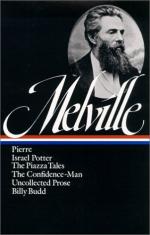After running two or three miles, and hearing no sound of pursuit, Israel reins up to rid himself of the handcuffs, which impede him. After much painful labor he succeeds in the attempt. Pressing on again with all speed, day broke, revealing a trim-looking, hedged, and beautiful country, soft, neat, and serene, all colored with the fresh early tints of the spring of 1776.
Bless me, thought Israel, all of a tremble, I shall certainly be caught now; I have broken into some nobleman’s park.
But, hurrying forward again, he came to a turnpike road, and then knew that, all comely and shaven as it was, this was simply the open country of England; one bright, broad park, paled in with white foam of the sea. A copse skirting the road was just bursting out into bud. Each unrolling leaf was in very act of escaping from its prison. Israel looked at the budding leaves, and round on the budding sod, and up at the budding dawn of the day. He was so sad, and these sights were so gay, that Israel sobbed like a child, while thoughts of his mountain home rushed like a wind on his heart. But conquering this fit, he marched on, and presently passed nigh a field, where two figures were working. They had rosy cheeks, short, sturdy legs, showing the blue stocking nearly to the knee, and were clad in long, coarse, white frocks, and had on coarse, broad-brimmed straw hats. Their faces were partly averted.
“Please, ladies,” half roguishly says Israel, taking off his hat, “does this road go to London?”
At this salutation, the two figures turned in a sort of stupid amazement, causing an almost corresponding expression in Israel, who now perceived that they were men, and not women. He had mistaken them, owing to their frocks, and their wearing no pantaloons, only breeches hidden by their frocks.
“Beg pardon, ladies, but I thought ye were something else,” said Israel again.
Once more the two figures stared at the stranger, and with added boorishness of surprise.
“Does this road go to London, gentlemen?”
“Gentlemen—egad!” cried one of the two.
“Egad!” echoed the second.
Putting their hoes before them, the two frocked boors now took a good long look at Israel, meantime scratching their heads under their plaited straw hats.
“Does it, gentlemen? Does it go to London? Be kind enough to tell a poor fellow, do.”
“Yees goin’ to Lunnun, are yees? Weel—all right—go along.”
And without another word, having now satisfied their rustic curiosity, the two human steers, with wonderful phlegm, applied themselves to their hoes; supposing, no doubt, that they had given all requisite information.
Shortly after, Israel passed an old, dark, mossy-looking chapel, its roof all plastered with the damp yellow dead leaves of the previous autumn, showered there from a close cluster of venerable trees, with great trunks, and overstretching branches. Next moment he found himself entering a village. The silence of early morning rested upon it. But few figures were seen. Glancing through the window of a now noiseless public-house, Israel saw a table all in disorder, covered with empty flagons, and tobacco-ashes, and long pipes; some of the latter broken.




